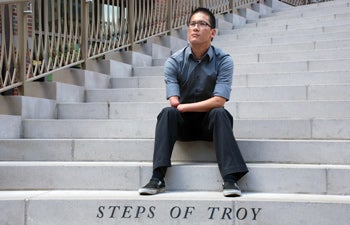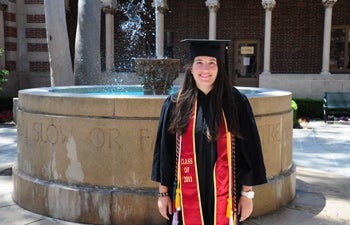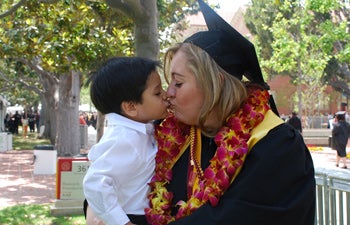Eyes Fixed on the Horizon
Now preparing for their next milestones, the first graduates under the name USC Dana and David Dornsife College of Letters, Arts and Sciences earned their diplomas on May 13. USC Dornsife issued more than 2,500 degrees during Commencement 2011: 2,071 bachelor’s, 253 master’s, 41 graduate certificates and 171 Ph.Ds. Here are three stories from our cadre of shining grads.
“We are thrilled to have witnessed the graduation ceremony for the first class of USC Dornsife students,” said Dana and David Dornsife. “We are excited for them and confident they will continue to make us proud in the future.”
‘There’s Nothing I Can’t Do’
John Lien Margetis types furiously on his laptop keyboard, then picks up his iPhone and quickly texts a friend. A few students at the Ronald Tutor Campus Center pretend they aren’t watching Margetis’ every move.
Born without hands, Margetis is used to people’s surprise at how fast he types even on an iPhone with tiny keys. He’s used to the stares.
“It doesn’t faze me,” he says, explaining that the multiple points of sharp contact on each limb act as fingers when he types. “It’s usually just curiosity.”

John Lien Margetis graduated with honors, with a B.A. in sociology in USC Dornsife, and B.S. in occupational therapy and will earn his master’s degree next. Photo by Pamela J. Johnson.
An honors student, Margetis graduated May 13 with a B.A. in sociology from USC Dornsife and a B.S. in occupational therapy. He opted not to attend Commencement, but plans to next year when he earns his master’s in occupational therapy. For one thing, his older brother is in France and he wants his family to be there.
Margetis has a unique family, or actually two families. He arrived in the United States as a 13-month-old from an orphanage in Taiwan. He is the third and youngest child of his adoptive mother, Monique Margetis, a doctor at Children’s Hospital Los Angeles and assistant professor in the Keck School of Medicine of USC, who has one biological son and a daughter she adopted from Brazil. Margetis is in frequent contact with his biological family in Taiwan, the Liens, although he has yet to meet them in person.
“Giving me up for adoption was something they thought long and hard about,” says Margetis, who was also born without feet in the developing country, but played soccer and ran track in high school. “They did it for the betterment of my life and the opportunities I would be given here. I think they did the right thing.”
Studying sociology in USC Dornsife gave him a broad foundation in which to view the world. After taking a general education course in occupational therapy, he knew right away he had found his career. Growing up, he used prostheses and vividly remembers the positive experiences he had with his occupational therapists. At 13, he decided to stop using prostheses on his upper limbs but is glad he has the skill.
Sociology meshes well with his chosen field.
“I can critically reason through all social issues,” he says. “As an occupational therapist, I’ll come across clients from all different ethnic and socioeconomic backgrounds.”
His own limb deficiencies will give him a deeper empathy with his clients.
“There’s nothing I can’t do,” Margetis, 22, says. “I just do it differently.”
— PJJ
USC Dornsife students, faculty, family and staff celebrate 2011 Commencement. View the full album on the USC Dornsife Facebook page.
She Puts the ‘Care’ in Health Care
Moving from Orwigsburg, Pa., population 3,000, Elizabeth Sophy expected to be out of her comfort zone. She welcomed the cultural diversity and all Los Angeles has to offer.
What she did not anticipate was the increased level of poverty.
“I did not see poverty the way we experience it here,” she says. “At home, it was not as blatant.”

Elizabeth Sophy, who earned a bachelor’s in biology and American studies and ethnicity in USC Dornsife, is co-director of A Community Place, a student organization serving the disadvantaged in the University Park neighborhood. She plans to become a doctor. Photo by Ambrosia Viramontes-Brody.
In Orwigsburg, Sophy threw herself into volunteer work. She vowed to continue her community service during college.
At USC, she immediately signed up to volunteer at A Community Place, a student organization providing services to the disadvantaged in the University Park neighborhood. For the next four years she volunteered with the organization serving as co-director for the past two.
Her daily interactions with clients inside and outside the organization solidified her aspiration to become a physician and help the underserved.
“Just talking to clients and listening to their problems made me realize I had a really strong interest in helping these people,” Sophy says. “It fit together like a puzzle.”
She double majored in biology and American studies and ethnicity in USC Dornsife. While her degree in biology would provide the scientific preparation, her second degree would provide the social context she needed to better understand the underrepresented population.
To further her experience and knowledge in the field, the USC Renaissance Scholar worked tirelessly with several associations to help those facing health care barriers. She volunteered with the Violence Intervention Program Family Advocacy Center at LAC+USC Medical Center, the USC Global Medical Brigades, and the Hilo Medical Center in Hawaii. Sophy’s contributions earned her the Grace Ford Salvatori Community Service Scholarship and J. Wesley Robb Endowed Scholarship in Human Values.
Intelligent and charismatic, the 22-year-old graduated May 13 with dual degrees. Her thesis on her research under Tansu Celikel, assistant professor of biological sciences, earned her the distinction of Bachelor of Arts in biology with honors. In the lab, she researched mouse behavioral studies and analyzed gene expression.
After graduation the aspiring obstetrician will consider two possible paths: attend Jefferson Medical College or defer for a year and travel for a fourth time to Honduras with the USC Global Brigades.
Whatever the path, her goal is firm.
“I believe I am a compassionate person who really empathizes with people,” she says, adding that she learned the attributes from her parents, Matthew a family physician and Julia, a nurse. “I want to use that strength to be a different kind of doctor in the world.”
— AVB
Schooling With Baby
Silvia Green arrived at USC Dornsife College as a sophomore transfer student from Los Angeles Trade-Technical College.
She was a new mother when she read a book by a Darwinian feminist anthropologist and came across one paragraph that dropped a bomb. In a discussion of mothers who commit infanticide, the author suggested that the majority of Sudden Infant Death Syndrome (SIDS) cases were due to unreported maternal infanticide.
“At first I thought, ‘OK, she’s crazy, she’s just nuts,’ ” recalls Green, who graduated with honors with a bachelor’s in anthropology. “She just sort of threw it out there and walked away from it. It’s a minefield, but I wanted to learn more.”

Silvia Green earned her bachelor’s in anthropology in USC Dornsife with honors and won awards for academic excellence, community service and leadership, while raising her 3-year-old son Hector, with her husband. Photo by Pamela J. Johnson
When Green could find no literature on maternal infanticide and SIDS, she began doing original research on the subject. After earning a USC McNair Scholarship and a USC Mellon Mays Undergraduate Fellowship, she wrote her senior thesis on hidden cases of maternal infanticide.
Her research, in part, earned her a Dr. John R. Hubbard Award from the USC Latino Alumni Association. The award also honored her for community service and leadership.
While at USC, Green volunteered to start up a mentorship component for local high school students with the USC/La Curacao Academic Achievement Program. For six months, she managed 180 mentor-mentee pairs and put together a photo-essay book of their stories. The work resulted in a grant to continue the program, and she is now an employee at La Curacao and USC staffer.
She did all of this while raising her now 3-year-old son Hector with her husband, Ricardo, a general contractor.
“It’s been a much different road for me,” Green, 31, says.
Green was one of six children being raised by a single working mother from El Salvador when she moved from her home in Huntington Park at age 16. As she saw her mother do, Green juggled two and three jobs to make ends meet, mostly retail. When working in sales wasn’t fulfilling, she sought an associate’s degree, thinking that a corporate office job might be more satisfying. But her general education courses were much more exciting to her, especially anthropology.
“USC was always there, but I always thought, ‘I can’t go there,’ ” said Green, who earned mostly A’s in community college. “I applied just out of curiosity to see if I could get accepted. To my surprise, I got a call from Norman Topping [Student Aid Fund] to come in and interview.”
Before entering graduate school, Green plans to be a child-birth educator and start a support group for students who are parents.
“In my mind, I didn’t think I would ever make it to USC,” Green says. “I don’t know why. I had the grades; I had the involvement. I just didn’t have the confidence. I have that now.”
— PJJ